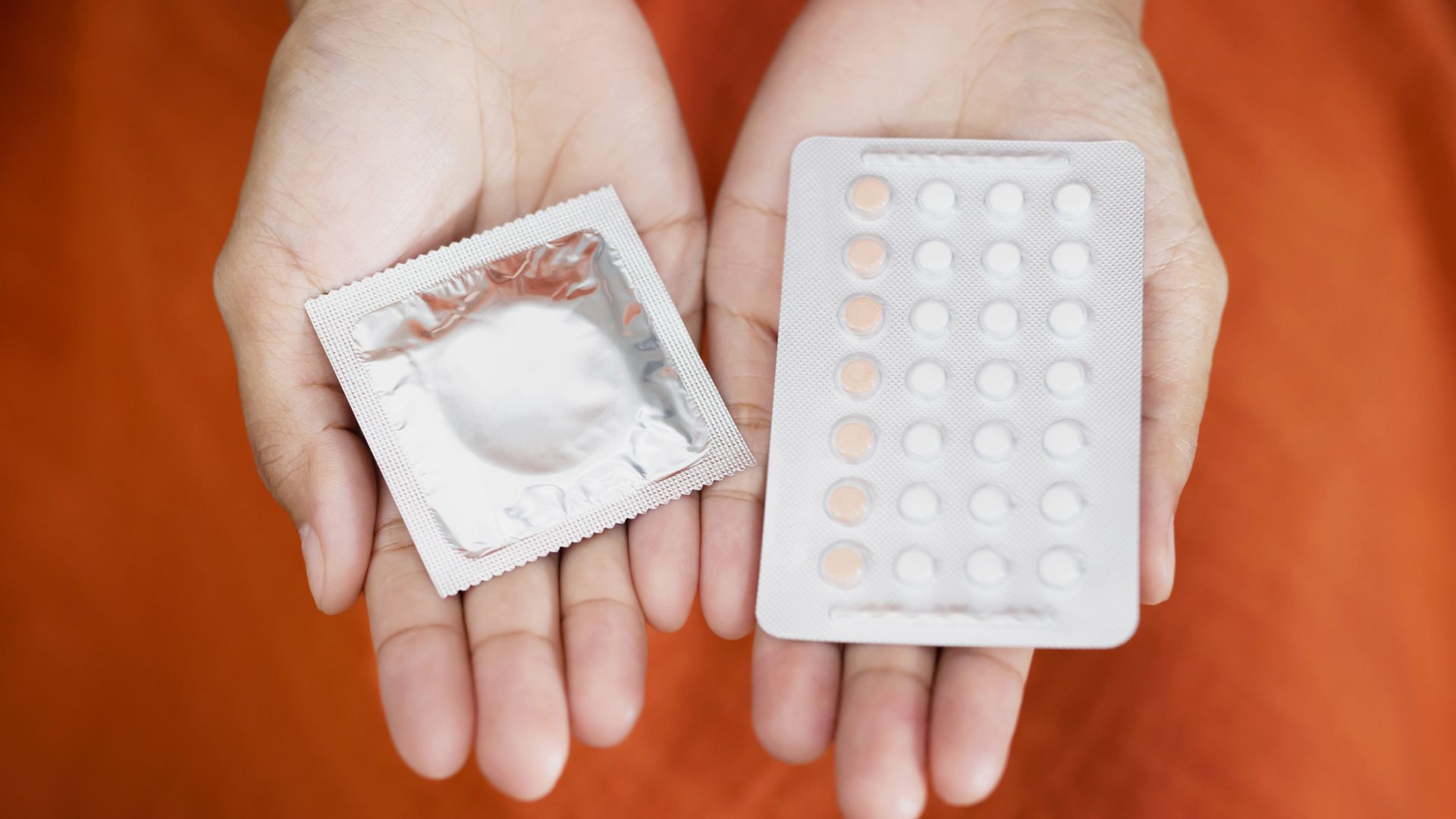8 unexpected health benefits of birth control
Birth control does more than prevent unplanned pregnancy.
Updated on January 11, 2024

About 7 in 8 sexually active women between ages 15 and 49 use contraception to avoid pregnancy, according to the Guttmacher Institute, a leading organization in reproductive policy and research. About 1 in 5 of those people take birth control pills.
While most people use birth control pills to prevent unplanned pregnancies or to space out their pregnancies, the pill can… Show More
About 7 in 8 sexually active women between ages 15 and 49 use contraception to avoid pregnancy, according to the Guttmacher Institute, a leading organization in reproductive policy and research. About 1 in 5 of those people take birth control pills.
While most people use birth control pills to prevent unplanned pregnancies or to space out their pregnancies, the pill can also do some other pretty amazing things. Taking birth control pills may reduce menstrual pain, acne breakouts, and more.
It’s important to talk with an OBGYN about your body and your menstrual cycles to better understand the right option for you. Meanwhile, here are eight things oral contraceptives can do besides reduce your chances of getting pregnant.
Show Less
You may be able to plan out your periods
If you and your OBGYN determine it’s safe and necessary to extend your menstrual cycles, birth control pills can do the trick.
A majority of combination birth control pills have three weeks of pills that contain hormones and one week of placebo pills without hormones. Bleeding should occur during… Show More
If you and your OBGYN determine it’s safe and necessary to extend your menstrual cycles, birth control pills can do the trick.
A majority of combination birth control pills have three weeks of pills that contain hormones and one week of placebo pills without hormones. Bleeding should occur during the placebo pill week, when you’re not taking hormonal pills. Some birth control pills, however, contain three months of continuous hormonal pills, meaning you’ll only have four periods a year.
Show Less
You can help control breakouts and body hair growth
If you’re spending too much money on skincare products or feel like you’re a regular at your waxing salon, birth control may help.
People who are assigned female at birth produce male hormones called androgens in both the ovaries and adrenal glands. It’s possible to produce androgens in excess,… Show More
If you’re spending too much money on skincare products or feel like you’re a regular at your waxing salon, birth control may help.
People who are assigned female at birth produce male hormones called androgens in both the ovaries and adrenal glands. It’s possible to produce androgens in excess, which can cause hair growth on the lips, chin, breasts, belly button, and inner thighs. Male hormones may also cause breakouts, too.
Taking birth control pills for as little as six months can help reduce the production of androgens, resulting in clearer skin and less hair.
Show Less
You’ll have regular periods
If you’re not getting regular periods or your periods are very long, birth control pills can help you get back on track.
If your menstrual cycle lasts longer than 35 days, your body’s hormone production may be off. Polycystic ovary syndrome, a condition in which a hormonal imbalance causes issues… Show More
If you’re not getting regular periods or your periods are very long, birth control pills can help you get back on track.
If your menstrual cycle lasts longer than 35 days, your body’s hormone production may be off. Polycystic ovary syndrome, a condition in which a hormonal imbalance causes issues with how the ovaries work, is the most common reason.
Typical birth control pills provide these hormones on a regular cycle, so periods are equally spaced apart.
Show Less
You won’t have to buy as many tampons
If you have a heavy period, your body may not be producing enough progesterone, the hormone that prevents over-growth of the uterine lining. Most people who take the pill have regulated uterine growth and lighter bleeding during their period.
The progesterone-like hormone in all birth control pills… Show More
If you have a heavy period, your body may not be producing enough progesterone, the hormone that prevents over-growth of the uterine lining. Most people who take the pill have regulated uterine growth and lighter bleeding during their period.
The progesterone-like hormone in all birth control pills controls the thickness of the uterine lining, causing lighter periods. Bonus: Some people may not experience bleeding at all.
Show Less
Your cramps might feel better
If abdominal cramps have you reaching for ibuprofen every month, taking birth control may help alleviate some of that discomfort.
During your period, the uterus produces prostaglandins, compounds that cause the uterus to contract and shed its lining. That contraction is what causes those… Show More
If abdominal cramps have you reaching for ibuprofen every month, taking birth control may help alleviate some of that discomfort.
During your period, the uterus produces prostaglandins, compounds that cause the uterus to contract and shed its lining. That contraction is what causes those uncomfortable menstrual cramps.
If your body produces more prostaglandins, you’re more likely to have stronger cramps. Birth control pills help by reducing the production of prostaglandins, resulting in less severe cramping.
Show Less
Your endometriosis pain may improve
Endometriosis is a health condition that causes the tissue lining the uterus to grow outside of the uterus. It can cause severe abdominal pain, especially during your menstrual cycle. The progesterone-like hormone in birth control pills can slow the growth of this tissue and reduce bleeding, which… Show More
Endometriosis is a health condition that causes the tissue lining the uterus to grow outside of the uterus. It can cause severe abdominal pain, especially during your menstrual cycle. The progesterone-like hormone in birth control pills can slow the growth of this tissue and reduce bleeding, which may help reduce pain associated with endometriosis.
Show Less
You’ll reduce your risk of anemia
If you tend to bleed heavily while on your period, you may be at a higher risk for anemia. Blood loss is one cause of anemia, a health condition during which your blood carries a reduced amount of oxygen to the rest of your body.
Taking active birth control pills (those with hormones in them) will… Show More
If you tend to bleed heavily while on your period, you may be at a higher risk for anemia. Blood loss is one cause of anemia, a health condition during which your blood carries a reduced amount of oxygen to the rest of your body.
Taking active birth control pills (those with hormones in them) will regulate menstruation and, in turn, reduce blood loss.
Show Less
Your risk of certain cancers may decrease
Studies show that oral contraceptives containing estrogen and progesterone reduce the risk of both ovarian and endometrial cancer. According to a study published in the American Journal of Obstetrics and Gynecology in 2017, those who used the pill during their reproductive years were less likely to… Show More
Studies show that oral contraceptives containing estrogen and progesterone reduce the risk of both ovarian and endometrial cancer. According to a study published in the American Journal of Obstetrics and Gynecology in 2017, those who used the pill during their reproductive years were less likely to get colorectal, endometrial, and ovarian cancers. The researchers followed 46,000 women for up to 44 years to get their results.
In another study published in September 2018 in The BMJ, researchers tracked 1.9 million Danish women from 1995 to 2014 to derive similar results. Ovarian cancer rates were lower in those who used combined birth control pills (including newer versions that contain lower levels of progesterone and estrogen than previous versions), compared with those who had never taken birth control pills. Researchers estimated, too, that using combined hormonal birth control prevented 21 percent of ovarian cancers among these women. Researchers continue to study people who are at an increased risk of ovarian cancer and how birth control may lower their risks.
Other research suggests that protection against endometrial cancer may increase the longer you take the pill and may continue up to a decade after you stop taking it. Keep in mind, however, that other studies have found that women who take birth control pills may have a slightly higher risk of breast cancer than those who’ve never taken them. But after stopping the pill, the risk goes back to baseline over time.
Show Less
Guttmacher Institute. Contraceptive Use in the United States by Demographics. May 2021.
Guttmacher Institute. Contraceptive Use in the United States by Method. May 2021.
American Society for Reproductive Medicine. Noncontraceptive Benefits of Birth Control Pills. Accessed November 4, 2022.
Mayo Clinic. Delaying your period with hormonal birth control. January 28, 2022.
American College of Obstetricians and Gynecologists. Can birth control pills cure PCOS? Last reviewed October 2020.
American College of Obstetricians and Gynecologists. Combined Hormonal Birth Control: Pill, Patch, and Ring. Last reviewed March 2018.
American College of Obstetricians and Gynecologists. Progestin-Only Hormonal Birth Control: Pill and Injection. Last reviewed October 2020.
MedlinePlus. Anemia. Last updated July 29, 2016.
Cleveland Clinic. 7 Benefits of Skipping Periods With Birth Control. October 5, 2020.
National Cancer Institute. Oral Contraceptives and Cancer Risk. Reviewed February 22, 2018.
American Cancer Society. Birth Control & Cancer: Which Methods Raise, Lower Risk. January 21, 2016.
Iversen L, Fielding S, et al. Association between contemporary hormonal contraception and ovarian cancer in women of reproductive age in Denmark: prospective, nationwide cohort study. The BMJ. 2018; 362.
Iversen L, Sivasubramaniam S, et al. Lifetime cancer risk and combined oral contraceptives: the Royal College of General Practitioners' Oral Contraception Study. Am J Obstet Gynecol. 2017 Jun;216(6):580.
Morch LS, Skovlund CW, et al. Contemporary Hormonal Contraception and the Risk of Breast Cancer. New England Journal of Medicine. 2017; 377:2228-2239.
Featured Content

article

article

article

article

article
